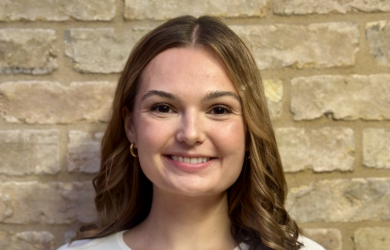
Tributes have been coming in from friends and colleagues for Arif Naveed who died at the weekend
Arif will be remembered for the quality of his friendships and his deep commitment to improving lives through education.
Emerita Professor Madeleine Arnot
It is with great sadness that the Trust has learned of the death of Gates Cambridge Scholar Arif Naveed [2014].
Arif did his PhD in Education at the University of Cambridge and won the Bill Gates Sr Award in 2018. This is an award nominated by other scholars and their nominations show the impact Arif had had even before he got his PhD.
One said: “Arif Naveed is one of the most remarkable people I have ever met. Arif is exceptional. He has built revolutionary reforms for poverty and education that will affect hundreds of millions of people. He has written the foundational texts on these problems and has produced very well regarded academic research in this field. And despite all of this, he still finds time to serve both the Gates community and the Cambridge community more generally.”
Achievements
Arif was born in a village in south Punjab in Pakistan and, having got into university, he started to question why he had done so well while other bright students in his school had dropped out of the education system. This question shaped his career in education research, which included working on an influential disaggregated multi-dimensional approach to poverty in Pakistan. His research asked whether a rethinking of education – the curriculum, textbooks and their delivery – in Pakistan is needed to ensure it responds to local priorities and meets the aspirations of citizens, and whether current schooling, shaped by the needs of colonial rulers, only adds to the dominance of existing elites.
Arif worked with the government and think tanks in Pakistan and the UK’s Department for International Development on education reform, specifically targeting the poorest, marginalised communities and girls. He was one of the lead designers of the Punjab Education Reforms which prioritise under-performing regions and aim to improve learning levels in schools in the province while also reaching out to 13 million out-of-school children. The Economist called the reforms exemplary for developing countries. Arif was co-author of an influential report by the US Commission on International Religious Freedom which reportedly led to a significant reduction in the pejorative portrayal of different religious groups in public school textbooks in Pakistan. His work was adopted by the Pakistan Poverty Alleviation Fund to prioritise the poorest regions for poverty reduction projects across the country.
While at Cambridge Arif continued to publish academic articles and present his research at conferences and co-founded a research cluster on Pakistan to explore innovative and critical scholarship on the country. He was also elected as an Executive Committee Member of the prestigious British Association of International and Comparative Education. In addition, he served as the Gates Cambridge Alumni Officer and was part of a pilot intergenerational housing scheme in the UK run jointly by Cambridge Hub and Cambridge Housing Services. More recently he moved to the University of Bath where he was Associate Professor/Senior Lecturer in Education and International Development.
Tributes
Madeleine Arnot, Emerita Professor of Sociology of Education at the University of Cambridge and Arif’s other co-supervisor, said: “Arif Naveed’s mission as a sociologist and economist of education was to achieve social justice for marginalised groups, especially those in poor communities. His internationally valued contribution was to design theoretical and methodological frameworks to analyse intergenerational, gendered social mobility in low-middle income countries like Pakistan. He brought to Cambridge his wide experience of framing educational reforms tackling the multi-dimensionality of poverty, unequal regional distributions of aid, and discrimination in school textbooks against religious communities. As a Gates Cambridge Scholar, his doctoral research added an understanding of the ‘hexagonal rural social structure’, a novel statistical method for analysing educational and economic mobility, and an innovative Habitus Listening Guide used to hear the polyphonic voices of the poor.
“Arif was exceptionally popular because of his humanity, his kind patience with others’ views, and his spiritual courage in coping with severe illness over many years. I was his MPhil and then doctoral supervisor, and over the last 15 years, Arif became a wonderful colleague, co-author and friend. He will be remembered for the quality of his friendships and his deep commitment to improving lives through education.”
Arif’s other co-supervisor Professor Anna Vignoles, now Director of the Leverhulme Trust, stated: “Arif was an exceptional PhD student and scholar, a supportive colleague, and someone who was not afraid to tackle difficult topics with an open mind and intellectual curiosity. He was always keen to debate others and respectful of their views. He enthusiastically sought out those from different disciplines, and his PhD was a truly ambitious interdisciplinary undertaking, seeking to bridge the notorious gap between economics and sociology as it applied to thinking about social mobility. He challenged the idea that Western-origin concepts of social mobility could be transposed to the Pakistan context. He improved our understanding of the role of education in reproducing social, economic and intersectional inequalities of various kinds, and illuminated its complex relation with caste and faith. Arif will be long remembered for his significant intellectual contribution but above all, I will miss his kindness, passion for life and willingness to educate so many of us with a gentle voice and beaming smile.
Fellow Gates Cambridge Scholar Peter Sutoris [2015], Lecturer in Climate and Development at the University of Leeds and a close friend of Arif’s, said: “Arif’s life – a journey of adversity, resilience and humble discovery – mirrored his mission as an academic. His contributions to the study of poverty reflected a deep understanding of the lived realities of the poor, realities he had experienced first-hand. In losing Arif, the world loses a unique voice of compassion, rigour and wisdom.”
Another close friend and Gates Cambridge Scholar Bhasi Nair [2014] said: “Arif was, simply put, the best man I knew. People often say things like that about people after they pass, but in Arif’s case, I used to say that long before he was even ill. He was so kind and gentle yet so gritty and determined at the same time. Above all, he was a deeply dignified man. He was my first friend in the Gates community, and I remember the first time I met him at orientation at Ambleside: after a long morning of high octane conversations, I was a bit socially worn out. Looking for a place to sit for lunch, I saw a man who radiated peace and warmth. I went and sat by him, and we became fast friends. For years we would drink green tea from Kashmir in his kitchen almost every evening, chatting late into the night about poverty, inequality, and the Global South. Arif was deeply committed to his work — which he saw as a spiritual calling. The world has lost a brilliant scholar and an even better human being. Such a loss is devastating beyond words, but our only solace is that we, his friends, can honour his memory by staying committed to the issues he cared deepest about.”
Fellow Gates Cambridge Scholar Rafiullah Kakar [2024] spoke about how Arif had mentored him. He said: “Arif Naveed was a great friend and mentor. I first met him in London in 2014 when he began his PhD as a Gates Scholar at Cambridge. He was a kind and humble person, and his journey from a rural area in South Punjab (one of Pakistan’s poorest regions) to Cambridge deeply inspired me…Arif was not only a brilliant scholar but also a person of remarkable resilience and humility.
“I was personally a beneficiary of his kindness. I learned about the Gates Cambridge scholarship and applied for it because of Arif’s encouragement. Arif’s legacy will live on, inspiring many through his contributions and his spirit. He will be deeply missed. May he rest in peace.”
*Read the tributes in full here.












